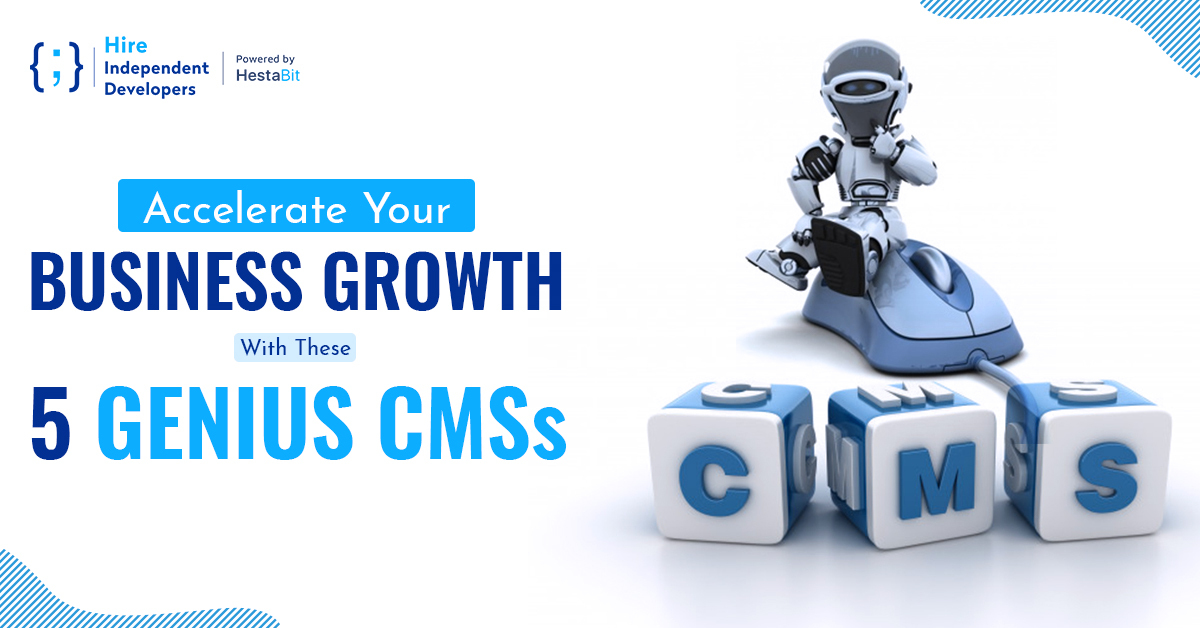A website is a window through which your business says hello to the world.
-Amit Kalantri (Indian Author)
As stated in the quote, a website plays a crucial role in scaling up an online business. They are the welcome mats of business growth. Therefore, if you need your company to scale up quickly, you need to find the best CMS (Content Management System) for your business to develop a dynamic business website.
A website will provide your business the edge it needs; it will offer you an incredible opportunity to cater to a massive audience and bring your product to a market of millions.
Finding best CMS for small business :
Adding, upgrading, and maintaining your business website is very important to maintain a healthy business flow. That’s why it is even more necessary to find the best content management system for small and medium-scale businesses.
Developers have been continuously working to make website development easier as they move ahead in time; thanks to their efforts, website development in 2021 is not a hectic task. You have the privilege of choosing from many platforms, providing you with an array of solutions to develop your site choice.
These solutions are majorly CMSs (Content management systems) popularly used by many companies to develop their websites.
However, determining which is the best CMS for small business is an arduous task. There are massive numbers of options available to choose from, therefore selecting the one that suits your business needs careful analyses where you align your goals and needs with the features the particular CMS provides you.
So in this article, we’ll introduce you to 10 of the best CMS platforms for business that can help you develop a dynamic website in the minimum possible time.
Want to set the confusion of which CMS to choose for a business website?
We’ll help you out!
But first, let’s start with the basics.
What is a Content Management System?
A Content Management System (CMS) is a platform that lets you publish and manage the content on the web in an inbuilt fashion.
Take an example of a text editor, like a notepad, which allows you to publish your articles directly to your website.
This is the most typical example of a CMS. of course, the CMS options we have now are much more advanced, providing the entrepreneur with brilliant functionalities. They allow you to index your content, make necessary changes, format it via virtual editors, and do a lot more.
A lot of people confuse CMS with a website builder
A website builder aims to create websites by developers who have little to no coding knowledge. This can be accomplished with an easy drag and drop editor. However, they are much more comfortable than developing a CMS since they offer minimal customization and control options.
On the other hand, CMSs require you to hire developers to work on your website since one needs to have a good hold of technical knowledge to move ahead in developing.
Entrepreneurs choose CMS to start with their websites since it comes with many incredible tools to enhance the design and provide modern solutions.
In short, a Content Management System is a one-stop solution for website creation and content management. Once you figure out which CMS suits your needs the best, you can move ahead to increase its functionality by adding “plugins” or “extensions.”
What can you create using CMS?
A lot of people believe in the misconception linked with CMS that it is particularly suited for blogging. This could’ve been true initially since the CMSs were created, keeping blogging in mind. However, most of them have drastically evolved to the point where they have become highly customizable.
One of the most significant website development CMS is WordPress, powering 35% of the total websites on the internet.
CMSs have now become quite flexible. Therefore, they provide a wide range of solutions for all your website needs. You can develop forums, online membership platforms, e-commerce stores, and a lot more.
What features should the top CMS platforms include?
We hope by now, you have a solid idea of what a CMS is, so let’s move ahead and understand the specific features they must offer. The best CMS for business websites should provide:
Easy way to publish new content:
A great CMS would include a robust editor and multiple options enhancing your content’s quality.
Content classification options:
The more you fill your website with content, the more critical it will become to manage everything properly. This is why you must choose a CMS that allows you to create categories, assign tags, etc.
Page editing functionality:
Publishing content is not the only thing your CMS is supposed to do; you will also have to create multiple pages to integrate into your website. The CMS you choose must offer all the tools you would require to get your work done.
High levels of customizability:
The CMS platform is considered to be “the best.” all have high levels of customization options. This means using these; you can add any functionality or feature you wish to integrate into your website, making it more advanced and dynamic.
A robust community:
CMSs having an active community base are constantly developed. Therefore, you will have continuous access to recent updates, fixes for security patches, and transfer knowledge from other developers.
These are the five essential features your CMS should most definitely have. Apart from this, any other CMS you choose will vary in features and functionalities they offer. Therefore, you may select the one which suits your project’s needs to the most extent.
Now comes the central question of this write-up.
What are the best CMS options for your website?
There’s a variety of CMS options we have carefully chosen to present before you. We have selected only the ones that have an open-source nature and are readily available. Which means you will not have to spend any money to try them out. Check out the most popular CMS for business
WordPress

WordPress is one of the most popular CMS in the world currently. It backs about 35% of the total active websites on the web. The CMS proudly holds the highest market share so far, and its unique features depict why.
Although the platform was initially aimed to provide better features for blogging, it has outgrown that. It is easy to use and customize, employing thousands of incredible themes and plugins offered by WordPress.
Read More: Install WordPress with Docker Compose
If you need to develop a site related to content management, wordpress is sure to provide a bang-on experience. It is easy to publish posts and images and format your content using a powerful editor.
Moreover, if you develop with WordPress, you’ll have access to a desirable and robust community, get regular updates, and better features for user registration.
To take full advantage of the CMS, you will have to hire WordPress developers to work on your website.
Read More: Convert WordPress Website to Mobile App
Key Features of WordPress:
- Includes built-in content management options and publishing features
- It offers a solid and powerful editor that allows you to format your content easily.
- You can extend your customization limits, thanks to thousands of plugins and themes offered
- Has a robust community base
Read More: WordPress: Selection to Execution. All That You Need to Know
Joomla
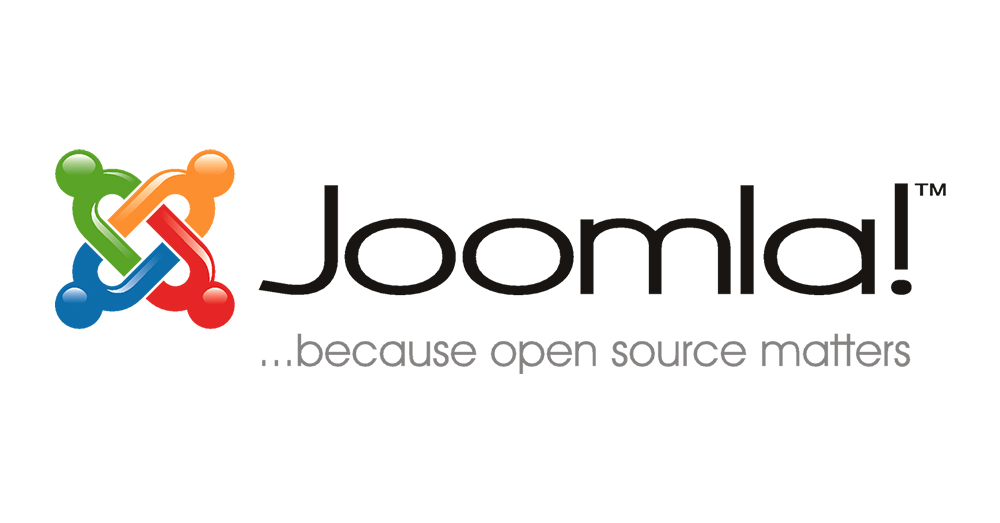
When entrepreneurs debate which platform can leverage their businesses, the two names they compare the most are Joomla and WordPress. Although WordPress holds a significant share of the market, Joomla comes next in power and popularity.
The general idea is that Joomla may not be as beginner-friendly as WordPress; it holds greater flexibility in some aspects.
For example, you can definitely use Joomla to manage a massive amount of custom post types. Therefore, it is ideal if you are running a website, mainly working text content.
Joomla also provides multiple options for user management; this makes it a phenomenal choice for membership-based websites.
Adding to that, Joomla offers multilingual support; therefore, if you plan to develop a website with various languages integrated into it, it can be done with no extra plugin or template requirements.
Key Features of Joomla:
- Offers incredible support for customizing post types
- Provides brilliant user management solutions
- Facilitates multilingual support
Drupal
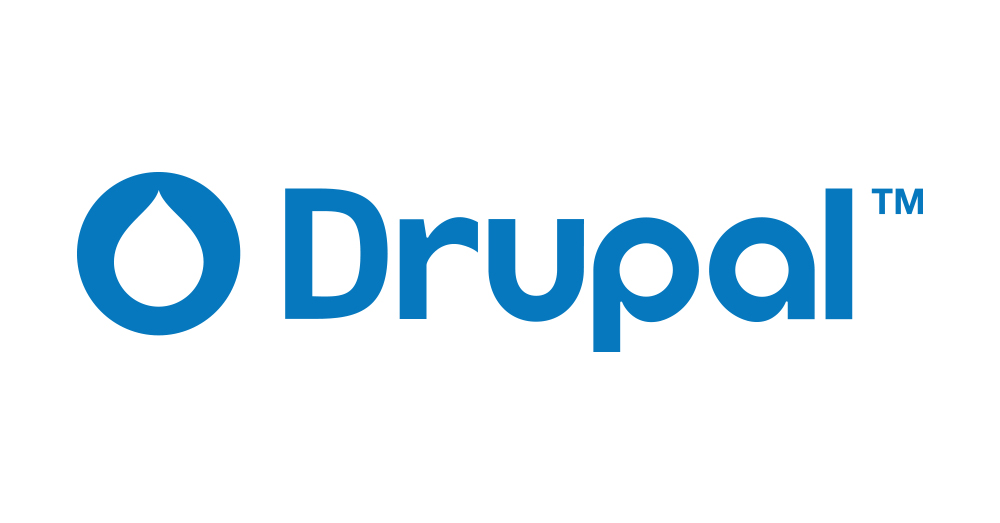
Another name that comes up in the discussion of the best CMS for a website is Drupal. Although the name and fame of Drupal are a bit less than that of WordPress and Joomla, it does not mean that it holds any less potential.
Digitally speaking, Drupal works excellently in many areas, as Joomla does. It provides a flexible system to manage custom post types. It also gives you great control over your users and their permission. Not just that, it too can handle multilingual websites.
However, there are certain aspects where Drupal outshines its competitors; take its advanced website security as an example.
Key Features of Drupal:
- Offers a flexible and customizable management system and post creation.
- Provides excellent permission and user management settings
- Has an extensive taxonomy system
- Offers excellent support for multilingual functionalities
- Provides advanced website security
You can develop a dynamic website using any of the three best CMSs mentioned above. However, if you are looking for more options, we will present the other pretty significant CMSs you can opt for.
Serendipity
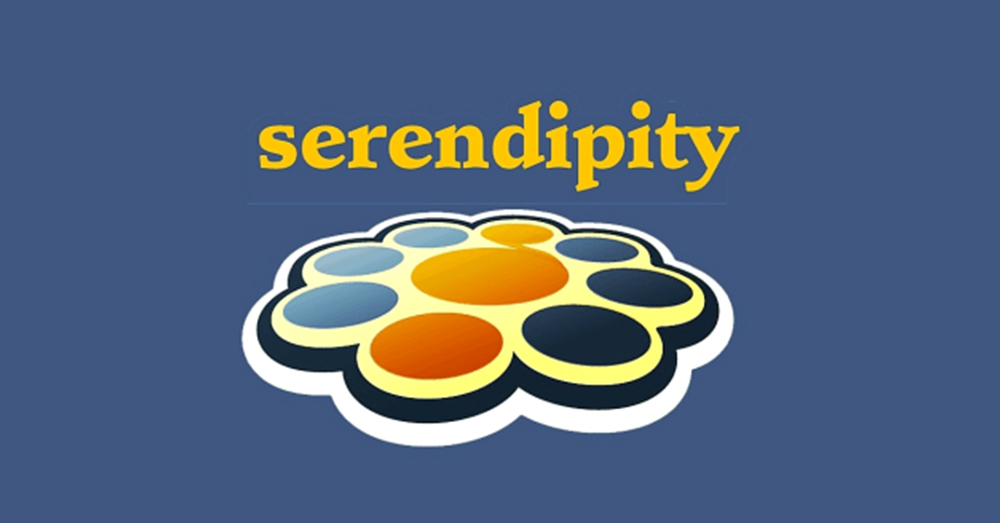
Serendipity is a CMS considered to be user-friendly and excellent for blogs. The CMS is one of the most lightweight platforms one can use to create small blogs.
Although in comparison to the three CMSs presented above, Serendipity may lose some points, it still provides a performance push to websites, thanks to its dynamic built-in caching system.
If you need to extend its functionality, you can always choose to do so, using external plugins and themes. For optimized results, you must look for both front-end and back-end plugins separately, so that you can easily find the tools you are looking for.
Key Features of Serendipity:
- An excellent choice for performance-oriented sites
- Caters to your customization needs by providing large selections of themes and plugins.
Dotclear
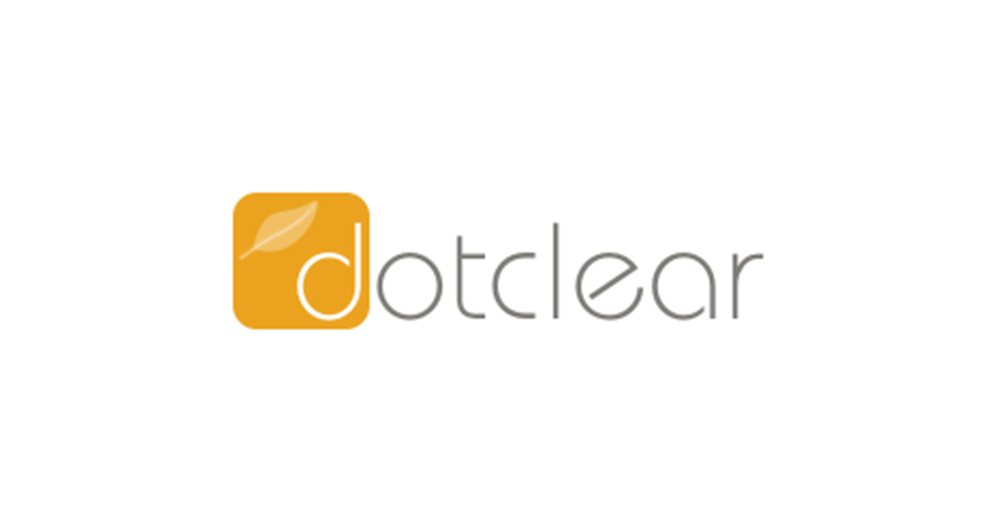
If you are looking for a simpler blogging experience, then Dotclear is a clear choice. While many CMSs can be a bit complex for an entrepreneur to understand, Dotclear provides a more straightforward way to execute your business-related tasks.
Apart from that, the editing experience offered by Dotclear is quite similar to that provided by WordPress.
Dotclear provides an extensive set of management, Taxonomy, and post publishing options. Using this platform, you can write the posts you publish in plain text, HTML, and Wiki Syntax.
The CMS also allows you to generate RSS feeds, plus, many functionalities can be added to your site via themes and plugins.
WooCommerce :

WooCommerce is the most efficient eCommerce platform and best CMS for startups globally. It is known for its manageability and flexibility. Although it isn’t really a CMS platform itself, instead, it runs its plugin on WordPress.
Since the platform is the umbrella of WordPress, it becomes fully compatible with the functions already available on your WordPress site.
Key features of WooCommerce
- It is accessible as free software; however, to get started, you will need a domain name and WooCommerce hosting.
- There are plenty of themes available that make the platform really easy to make your website look presentable.
- WooCommerce also has several extensions called plugins available that act as additional features to your website.
- You can even manage your inventory with this platform and keep track of everything in your stock.
Wix

Wix is another popular and ideal CMS for beginners. It comes with an easy-to-use editor that allows your site to look just the way you want. Wix is beginner-friendly and can really help startups to get on their feet through its manageable tools and features.
Key features of Wix :
- The platform has a drag and drop interface, which makes creating pages effortlessly. You can easily select any part of the page and edit it.
- Wix has a library of pre-made templates that you can choose to use. The templates are fully responsive and look amazing on computers and mobiles.
- You get to add multiple apps from the Wix App Market to your site. They will act as plugins for the website.
Shopify :

Shopify is said to be an all-in-one hosted CMS platform. You would need to purchase hosting, install any software, or maintain any security backup or upgrade. The platform is also preferred due to its straightforward drag and drop interface.
Shopify supports in-store sales, which is the cherry on the cake if you have a physical store with a web presence.
Key features of Shopify :
- By using Shopify’s integrated payment solution, you can accept debit and credit cards. PayPal is also considered one of many of Shopify’s default payment providers.
- Even with Shopify, you get multiple themes and extensions. You can even create third-party Shopify applications that will help you add more functionality to your site.
- The platform gives 24/7 support via email, phone, Twitter, and live chat.
Ghost

Ghost is already famous among bloggers. You might have heard about Ghost as a “headless CMS,” which at first sounds quite odd. This basically is said to be a platform that doesn’t force content delivery in a specific manner.
Any content or data you generate will be shown on your site, but you can also send this to any mobile application. If you are not looking for a developer and you just want to use a platform for pure blogging, Ghost is the one for you.
Key features of Ghost :
- You can utilize Markdown when you are working with Ghost editor. Markdown is a process of formatting text to make unique characters bold, Italic, or any way you want.
- Ghost has amazing support for SEO, and therefore you may not need any plugins to deliver this.
- Ghost comes with a content editor that uses cards. These cards appear very similar to WordPress blocks.
Magento :

Magento is a powerful CMS platform specifically designed for eCommerce. It is used by the popular software company Adobe and many other high-profile organizations. You can install the free version by your own hosting account from Magento open source.
And if you prefer, you can pay for Magento Commerce. It can be pretty expensive but will provide you full support for your website.
Key features of Magento :
- The platform is highly customizable, along with multiple third-party extensions.
- It becomes super easy to handle a lot of products and customers with Magento. Your site will hardly slow down with this CMS.
- Big brands such as Ford, Nike, and Coca-Cola prefer Magento for their website.
- The platform also supports different payment gateways along with options like PayPal and Cash on delivery.
Conclusion
Those were ten of the best CMS for startups and small business and other options you can start your business with. While there may be many different options that lure you to develop your website, these ten rock the market. We hope this write-up helped you make up your mind about which is the best CMS that aligns with your goals and objectives.
If you are still skeptical, you can always take help from a professional and clear your thoughts.
Make a list of things you want your CMS to achieve, do some research, consult an expert, and get on with your work.
We just simplified it for you a bit; we are sure you’ll do the rest.
